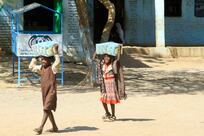Now may be the time for the Iraqi diaspora to play an important role in the country’s long-term development, the country's former UN ambassador said.
Speaking alongside a panel of Iraqi experts at an online event, Feisal Al Istrabadi said the first wave of those returning to Iraq after the 2003 war contributed to Iraq's fragmentation.
The years of conflict and sanctions left Iraq in dire need of input from its diaspora.
But Mr Al Istrabadi said that the influx of expatriates after the fall of Saddam Hussein’s regime contributed to local perceptions of self-interest and corruption.
“A lot of the expats returned to Iraq, not with the idea of contributing to rebuilding but with an expectation of senior positions, or of showing the Iraqis how it should be done, rather than listening to the Iraqis and learning from them what their needs were,” he said.
Discussing the recent paper by Dr Oula Kadhum on the mobilisation of the diaspora, the speakers agreed that the failings of those who returned blocked much-needed human potential.
Dr Kadhum said there was distrust and suspicion from the Iraqi population towards the "first generation" diaspora who returned after 2003, but a new "second generation" could be used with greater collaboration and development.
“It [needs] a social contract that's founded on technocracy and meritocracy, rather than networks of patronage and nepotism," she said at the event, which was organised by the Atlantic Council.
"So it's through that relationship that trust in the diaspora can be rebuilt."
Armed with skills, expertise and western degrees and qualifications, many Iraqi expats had hoped to return and contribute to the nation’s rebuilding.
Join us for a panel & release of our latest paper on #Iraq’s #Diaspora.
— Dr. Abbas Kadhim (@DrAbbasKadhim) March 22, 2021
Today, March 22, 10:00 am EST/5:00pm Baghdad Time.
Panel: Amb. @FIstrabadi, @DrAbbasKadhim, Dr. @MarsinRA & paper’s author Dr. @OulaKadhum.
Watch online or Register here👇: https://t.co/9MQHTbZrTO
“There's a strong desire to help and many had, of course, hoped to put the degrees and qualifications to good use in Iraq," Dr Kadhum said.
"But of course, the biggest impediment has been the security context."
The ethno-sectarian political system that replaced Saddam's regime led to years of violence and corruption that deterred many experienced and willing Iraqis from returning.
Dr Abbas Kadhim said Iraqis needed to start looking differently at the diaspora in Europe and in and the Americas.
"Most of the stereotype about the Iraqi diaspora has been made or crafted around the image of the returning Iraqis who would work in politics," Dr Kadhim said.
"And that's where I think the negativity came from, but let's remember that this is only a small slice of the Iraqi diaspora that returned or tried to return."
Dr Kadhum said the relative peace in Iraq in the past few years was an opportunity that should not be missed to harness the second generation of Iraqi expatriates.
“There needs to be some kind of formal procedure, a platform or a channel for the diaspora to connect to those in Iraq requiring support, training and knowledge transfer," she said.
"The Iraqi government could create this channel if it's interested in harnessing the potential of the diaspora, or it could be conducted through an NGO, international organisation or even from within the diaspora.”







